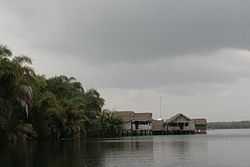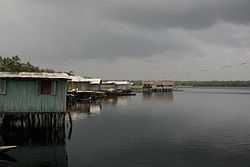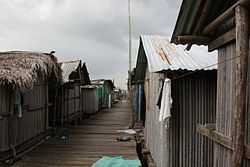Nzulezo
| Nzulezo (Nzulzu) | |
|---|---|
| Name as inscribed on the World Heritage List | |
|
View of Nzulezo village | |
| Type | Cultural |
| Criteria | i, iii, v |
| Reference | 1394 |
| UNESCO region | Africa |
| Inscription history | |
| Inscription | 2000 (24th Session) |
| Extensions | 2006 |
The village of Nzulezo (or Nzulezu) is located near the village of Beyin, roughly 90 kilometers west of Takoradi, in the Jomoro District of the Western Region of Ghana.[1]
Nzulezo overlooks the Lake Tadane, and is entirely made up of stilts and platforms. In 2000, it was nominated as a UNESCO World Heritage Site, and it is a major tourist attraction area.[1]
Etymology
The village's name "Nzulezo" in Nzema language, means "surface water". According to local legend, the village was built by a group of people from Oualata, a city of the ancient Ghana Empire and in present day Mauritania, which came about from following a snail.
Construction
Nzulezo was built over Lake Tadane, the settlement of Nzulezo consists of stilt-supported structures integrated seamlessly with the water-dominated natural landscape.[1]
It is not known why the village has been built over the water, the main activities of its inhabitants is agriculture, while the fishery plays a secondary role. The lake is however perceived by the local population to protect against certain risks (e.g. a fire).[1]
World Heritage Status
This site was added to the UNESCO World Heritage Tentative List on January 17, 2000, in the Cultural category.[1]
The village was nominated to become a World Heritage Site for its importance in anthropology: in addition to being one of the few ancient settlements on stilts and platforms left in the world, there is a preserved wealth of local traditions connected with the cult of the lake.[1] Lake Tadane occurs on the banks of all religious rites, and Thursday, is a day sacred to the lake, and it is forbidden to use and work on the lake for any activity throughout the day of Thursday.[1]
In recent times the village has been opened to tourism, but with certain constraints (visitations are allowed only once a week).[1] The village can be reached only by a canoe; the route, which crosses the rain forest, takes about an hour to 5 km away. In the village there is a church and a school. As the village is extremely isolated, Nzulezo suffers from numerous health problems, including the vast spread of malaria.[1]


